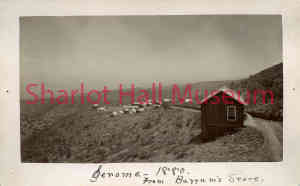Jerome Mining Camp
details
Mitchell & Baer Unknown 1600.0212.0001.jpg M-212 B&W 1600-0212-0001 m212pa Photo Card Print 5x7 Historic Photographs 1880s Reproduction requires permission. Digital images property of SHM Library & ArchivesDescription
Jerome Mining Camp overview, Jerome, Yavapai County, Arizona Territory c. 1880's. Handwriting on the photograph reads: " Jerome Mining Camp from Buffum's Store, 1880."
The town of Jerome was named for Eugene Jerome, one of two New York principles who lent financial aid to this area's mines early in its' history. Mr. Jerome was the first secretary of the United Verde Copper Company.
The town of Jerome grew up around the successful United Verde Mine, it was situated on the eastern slope of the Black Hills, in Yavapai County, Arizona. This valley had been inhabited by native peoples for prehistoric centuries; numerous remains of their dwellings were found in the cliffs and gorges and on the mountain tops. The first white men settled in the area around 1865. The fertile Verde River proved beneficial for farming. However, others were more interested in prospecting the surrounding hills, and an outcropping of copper-bearing ore was discovered in 1876.
The United Verde Copper Company was organized in 1882. This was the start of a mining legacy; the rich copper ore deposits turned Jerome into a boom town; by 1929 the population had grown to an estimated 15,000. In its' heyday, Jerome's prosperity saw the usual influx of profiteers and it was labeled as the wickedest town in America by the New York Sun newspaper.
Succeeding owners including Senator William A. Clark and James S. Douglas. Clark's United Verde Copper Company and James "Rawhide Jimmy" Douglas' Verde Extension mines produced millions of dollars' worth of copper, gold and silver.
In 1935, Phelps Dodge Corporation purchased the United Verde property and continued operating it until 1953 when the last of the mines shut down.
Jerome seemed doomed as the population dropped to less than 100. But a new breed of settlers slowly moved in and the town became a modern age tourist attraction and haven for artists, environmentalists, bikers, retirees and more.
Purchase
To purchase this image please click on the NOTIFY US button and we will contact you with details
The process for online purchase of usage rights to this digital image is under development. To order this image, CLICK HERE to send an email request for details. Refer to the ‘Usage Terms & Conditions’ page for specific information. A signed “Permission for Use” contract must be completed and returned. Written permission from Sharlot Hall Museum is required to publish, display, or reproduce in any form whatsoever, including all types of electronic media including, but not limited to online sources, websites, Facebook Twitter, or eBooks. Digital files of images, text, sound or audio/visual recordings, or moving images remain the property of Sharlot Hall Museum, and may not be copied, modified, redistributed, resold nor deposited with another institution. Sharlot Hall Museum reserves the right to refuse reproduction of any of its materials, and to impose such conditions as it may deem appropriate. For certain scenarios, the price for personal usage of the digital content is minimal; CLICK HERE to download the specific form for personal usage. For additional information, contact the Museum Library & Archives at 928-445-3122 ext. 14 or email: orderdesk@sharlot.org.




